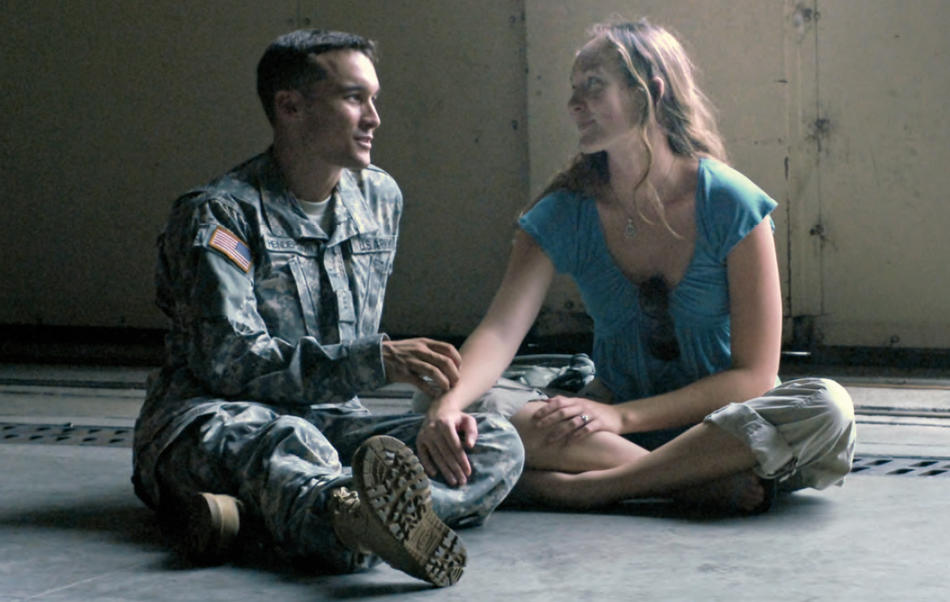Artis Henderson ’10JRN was twenty-six years old and had been a wife for just four months when suddenly, she wasn’t anymore. From that point forward — the point at which her husband, Miles, was killed in a helicopter crash in Iraq — she was, in the words of the United States Army, an unremarried widow.
The phrase is cold and sterile, reducing Henderson’s devastation to a box to be checked on the endless forms that came in and out of her new life. But there is a sort of poetry behind it, too. With efficiency, it outlines the paradox of young widowhood: the unthinkable notion that the lost spouse could be replaced, and the simultaneous hope for a future even without him.
Henderson’s memoir, which borrows the Army’s phrase as its title, began as a New York Times “Modern Love” column, a feature that has given rise to several memoirs of grief, particularly from war widows. But Henderson’s story had a bizarre hook. When she was a little girl, she was flying with her father, a pilot, when the engine malfunctioned, sending the plane nose first into the trees behind their Georgia home. It took six weeks to repair Henderson’s spine, leaving a scar running down the middle of her back. Her father never made it out of the plane.
“The aborigines say we live a spiral life, that our narratives curl around like smoke,” Henderson writes, “the events of one moment rhyming with the events of previous moments so that in a single lifetime we live the same story many times.” The parallels between her father’s and her husband’s deaths are haunting, but Henderson doesn’t dwell on them, a move that saves her story from feeling maudlin. Rather, she says, her father’s death gave her a “road map for this grief” in the form of her mother, “who never remarried. Who was permanently, unpardonably alone. Who I had tried my entire life not to become and whose fate, despite my best efforts, I now shared.”
Being alone, oddly, was not something that Henderson ever feared; she just wanted it to be by choice, by virtue of independence, rather than being abandoned by a man, even faultlessly in death. Before Miles, Henderson was the Penn student who “handed out condoms on the walk, and ... encouraged young women to dictate the terms of their lives.” Yearning to write and to live abroad, she joined a teaching program in Paris, until homesickness brought her back to Florida, where she was raised, and where she found Miles.
Initially, Miles was everything she thought she didn’t want. He was a conservative Christian Republican, and she was a liberal Democrat. She vehemently opposed the war in Iraq, while his face lit up at the sight of an Apache helicopter. She still had a bank account open and waiting for her in France; he had several years of Army bases and deployments ahead of him. But cooking eggs with him the morning after their first date felt right in an inexplicable way: “It looked nothing like the life I had imagined and yet it was the most natural thing in the world, with Miles there at the center of it.”
Before his deployment, Miles was stationed at a series of Army bases in dusty, depressing American towns, and Henderson followed him, sidelining her own career prospects in favor of dead-end jobs. She’s honest and unsparing in describing the difficulties of this kind of life: her loneliness, her desire to settle somewhere more permanently, her frustration at her lack of professional options. She’s also unapologetic about the choice, one that countless women have made and few write candidly about. When talking to a colleague about how a Wharton grad ended up a teacher’s aide at a tiny Texas elementary school, she thinks, “How could I tell him that Miles was what I had been looking for my entire life? That even in that shitty job in that god-awful town, I still considered myself a lucky, lucky girl?”
Then came the day that Henderson had dreaded since she met Miles. “Women would tell me later that they knew. Just knew,” she says. Her foreboding came when she dented her new car in the grocery-store parking lot, and drove home angry, “the seed of unease stuck like a stone in the back of my throat.” She chronicles the following days with remarkable detail — the private moments she stole during the funeral, retreating to the bathroom to whisper, “I miss you ... I miss you so much”; the wire-rimmed glasses that her casualty-assistance officer said made him look smarter, having the audacity to seek a polite smile in her blank face; the relentless slogging through military bureaucracy it took to find out exactly what had happened to her husband.
Eventually, Henderson resumed the life that she’d planned before meeting Miles. She got a job as a newspaper columnist, earned a master’s in journalism from Columbia, spent time living and writing in West Africa and the South of France. In many ways, there was more in her life then that made her happy than there had been when Miles was alive. But, of course, it wasn’t an even exchange. Early in her widowhood, Henderson decided that she would consider herself healed “when I would not trade everything in my current life to have Miles back. Every new moment, every new experience, every new love.” That, she eventually realized, was an “ impossible bargain.”



